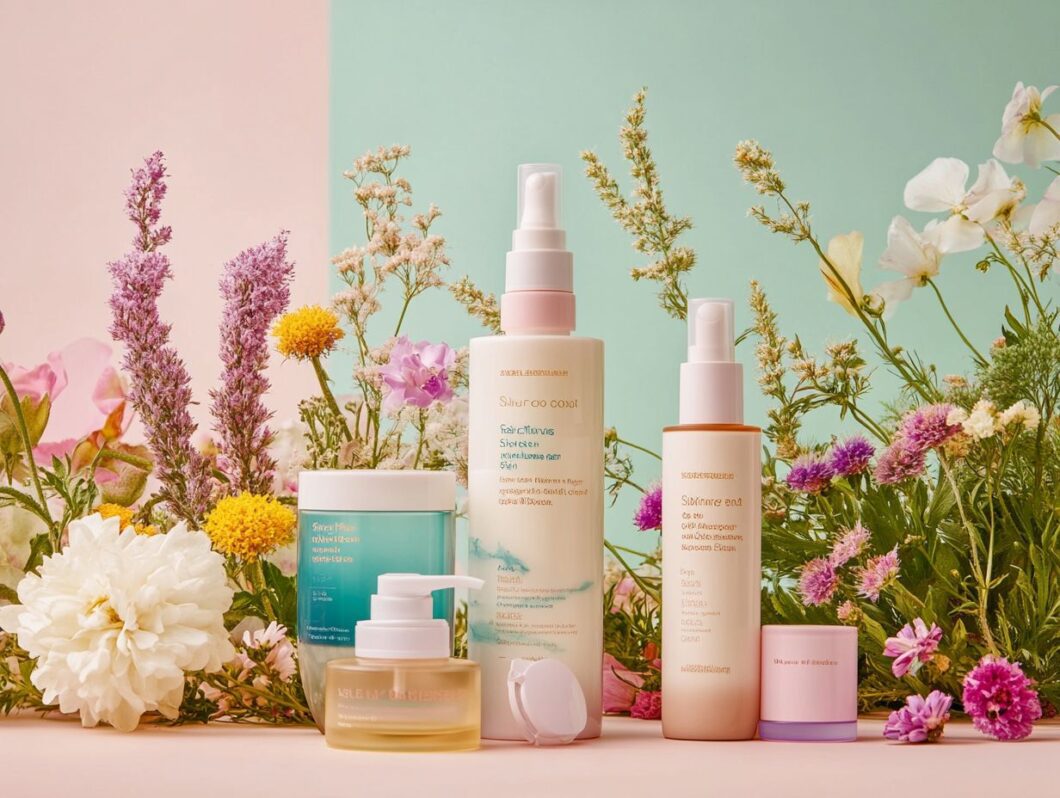Allergy season presents significant challenges for many individuals, often turning my beauty routine into a continuous struggle against sneezing and irritation.
Understanding the triggers of these allergies and identifying when they occur is crucial for effective preparation.
This article delves into the science behind allergies, highlights essential beauty products that help keep my skin and eyes comfortable, and provides practical tips for managing symptoms at home.
With the right knowledge and tools, I can navigate allergy season while maintaining my appearance and overall well-being.
Key Takeaways:
Understanding Allergy Season
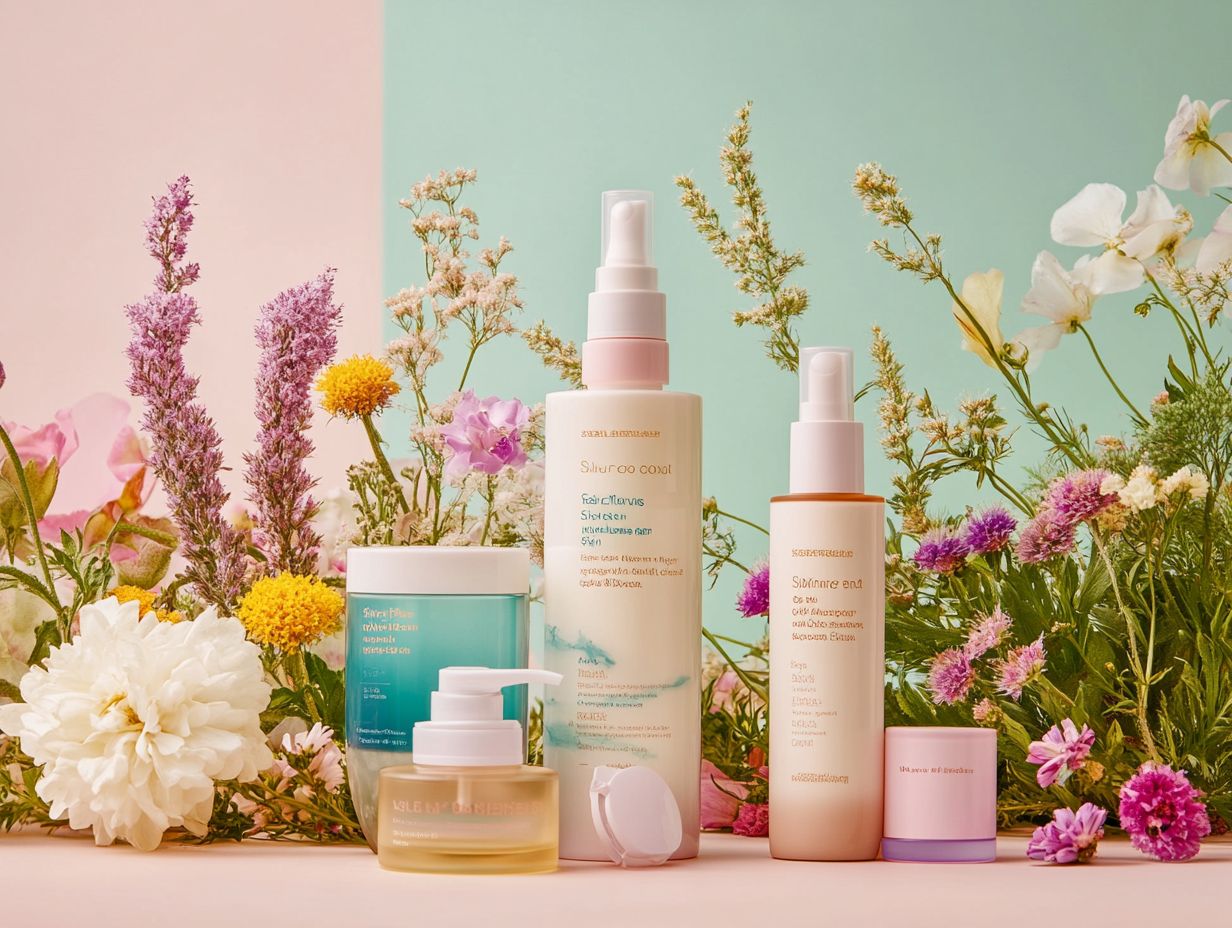
Understanding allergy season is essential for individuals like myself who suffer from allergies, particularly during peak periods when pollen levels increase.
Allergies can lead to a variety of symptoms, including red patches on the skin, swollen eyes, and respiratory issues, resulting in significant discomfort. Hay fever, a prevalent allergy, can intensify these symptoms, especially for those with sensitive skin.
This underscores the importance of a comprehensive skincare regimen that emphasizes hydration and soothing ingredients. By knowing the triggers of allergies and their timing, I can effectively prepare and manage my symptoms, ensuring that I maintain my well-being throughout the season.
What Causes Allergies?
Allergies primarily arise from the immune system’s reaction to foreign substances known as allergens, such as pollen, dust, and pet dander, which can lead to conditions like hay fever.
Among these allergens, pollen is particularly significant, especially during the spring and fall when trees, grasses, and weeds release their spores into the air. For many individuals, even a slight breeze can trigger itchy eyes, runny noses, and sneezing fits, making outdoor activities quite challenging.
This is where antihistamines prove to be beneficial; these medications counteract the body’s histamine response, which is the main culprit behind the uncomfortable allergy symptoms. By effectively blocking histamine, antihistamines provide relief from congestion and irritation, allowing individuals to appreciate the beauty of the changing seasons without the burden of allergic reactions.
When is Allergy Season?
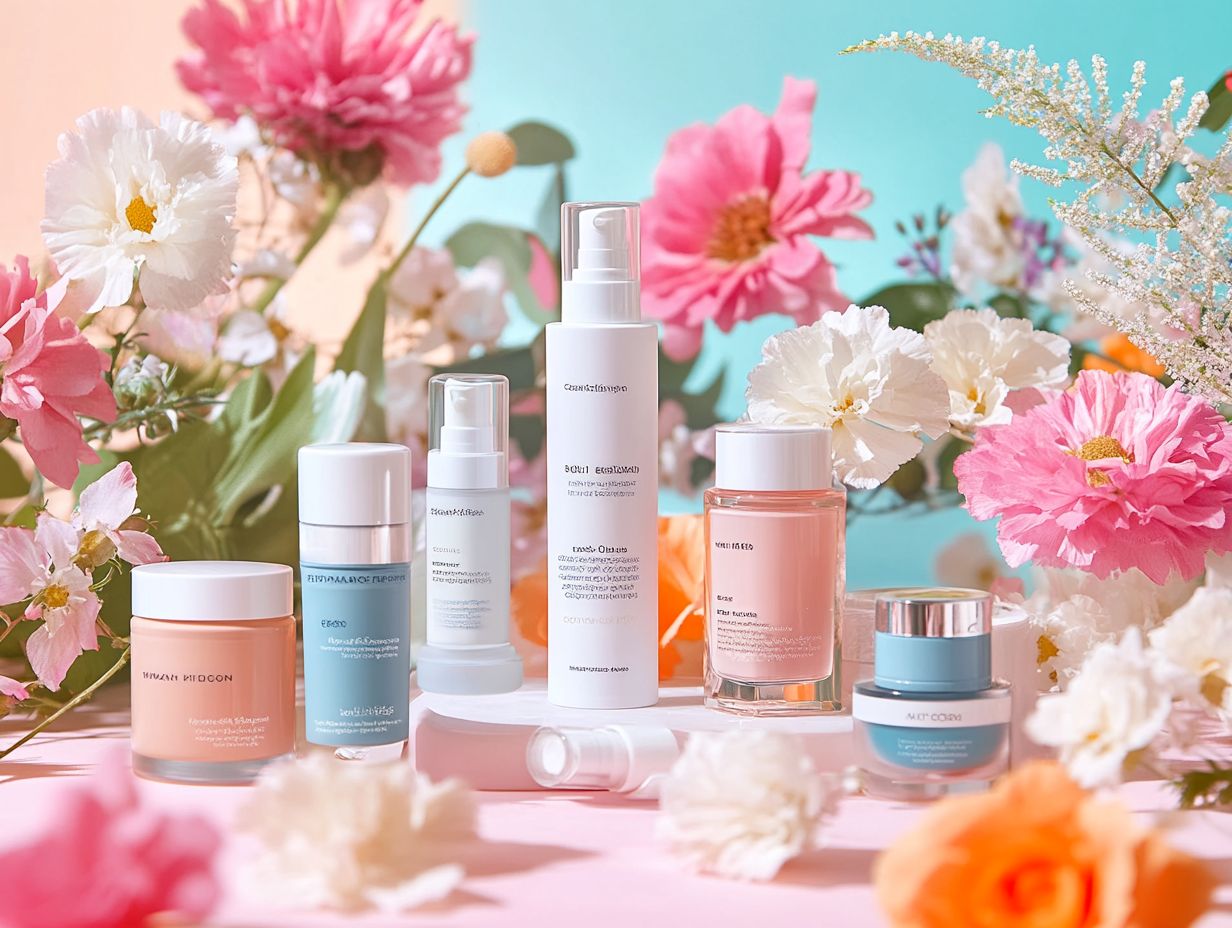
Allergy season typically occurs during the spring and fall, when pollen levels are highest due to blooming plants and changing weather conditions, often resulting in conditions such as hay fever.
In the spring, I observe that tree pollen begins to rise in March, peaking in April as trees like oak and birch release their pollen into the air. This influx is often intensified by warm, breezy days, which can carry allergens over long distances.
As summer approaches, I note that grass pollen takes precedence, generally peaking in June, while ragweed follows closely in the fall, with its season spanning from August to October.
For individuals with sensitive skin, these fluctuating pollen counts can trigger not only respiratory issues but also skin reactions, such as rashes or hives, particularly when pollen combines with other environmental factors like humidity or temperature variations.
Must-Have Beauty Products for Allergy Season
During allergy season, I find it essential to have the right beauty products readily available to protect my sensitive skin and mitigate the effects of allergens.
My skincare routine includes a moisturizing balm that not only provides hydration but also strengthens the skin barrier against irritants. I consider antihistamine eye drops a necessity for relieving swollen eyes and redness caused by pollen.
To ensure that my sensitive skin remains unharmed by cosmetics, I opt for non-comedogenic makeup. Furthermore, I prioritize the use of SPF to protect my skin from sun damage, particularly when I anticipate increased outdoor exposure.
Antihistamine Eye Drops
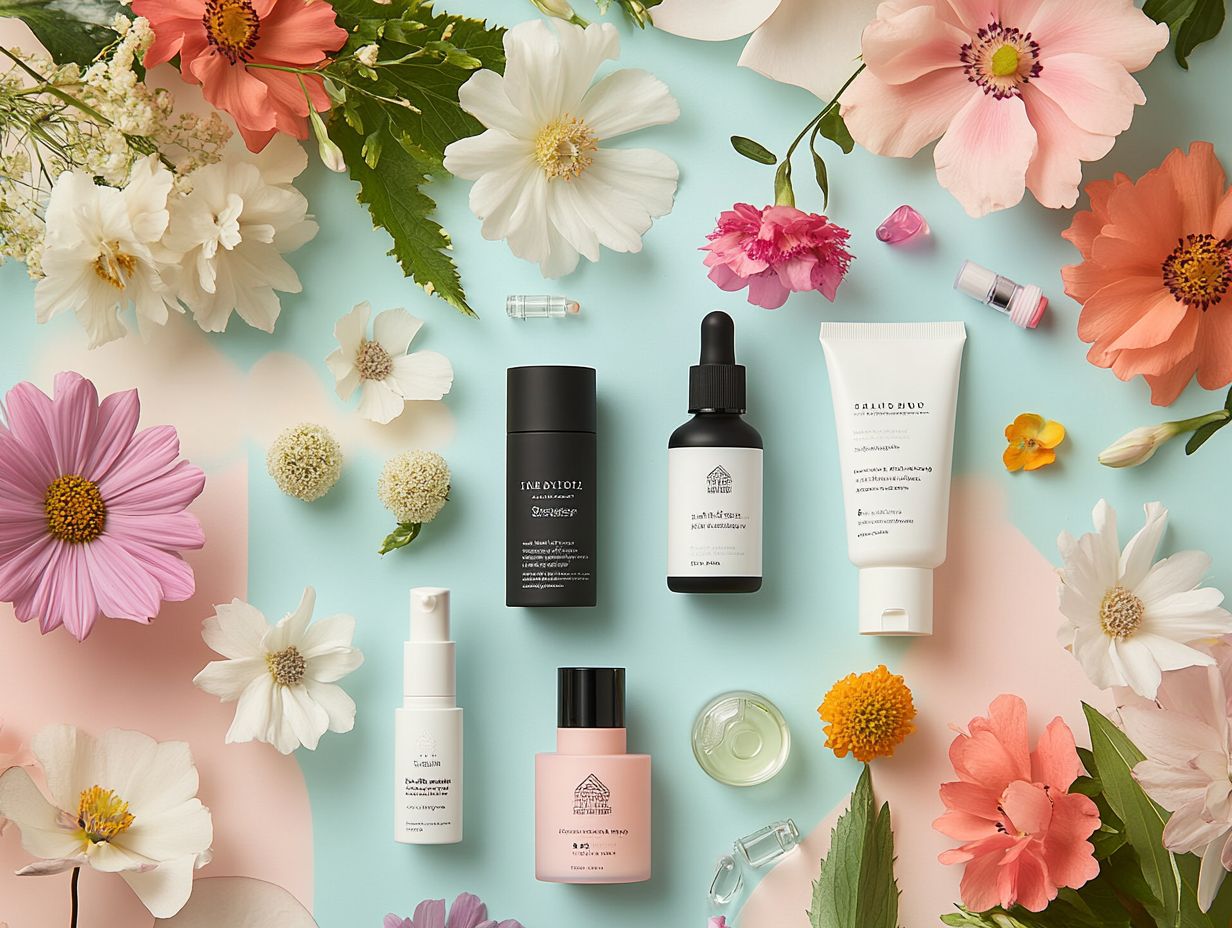
Antihistamine eye drops are an essential product for anyone dealing with swollen eyes and redness caused by allergies, as they provide prompt relief from discomfort.
These specialized drops function by blocking the action of histamines, which are substances released during an allergic reaction that contribute to symptoms such as itching, redness, and swelling. When applied, they rapidly soothe irritation, allowing me to alleviate the distress associated with allergy symptoms.
I often opt for products that contain active ingredients like azelastine or ketotifen, both of which are well-regarded for their effectiveness in treating allergic conjunctivitis.
To maximize the benefits, I ensure to use the drops as directed, keeping my hands clean before application and avoiding contact between the tip of the bottle and any surfaces to prevent contamination. Additionally, I find that regular usage during peak allergy seasons helps keep my symptoms in check.
Moisturizing Nasal Sprays
Moisturizing nasal sprays have proven to be effective tools for addressing dryness and irritation in the nasal passages caused by allergies, significantly enhancing hydration and comfort.
These sprays create a protective barrier that helps maintain optimal moisture levels, making them an excellent choice for individuals experiencing the discomfort associated with seasonal allergies. Users often report relief not only from dryness but also from subsequent sinus pressure and congestion.
For optimal results, I recommend applying the spray prior to exposure to allergens and reapplying as needed throughout the day.
Among the popular options available, saline-based sprays stand out as gentle and effective solutions, ensuring that the nasal membranes remain hydrated without the use of harsh chemicals.
Non-Comedogenic Makeup
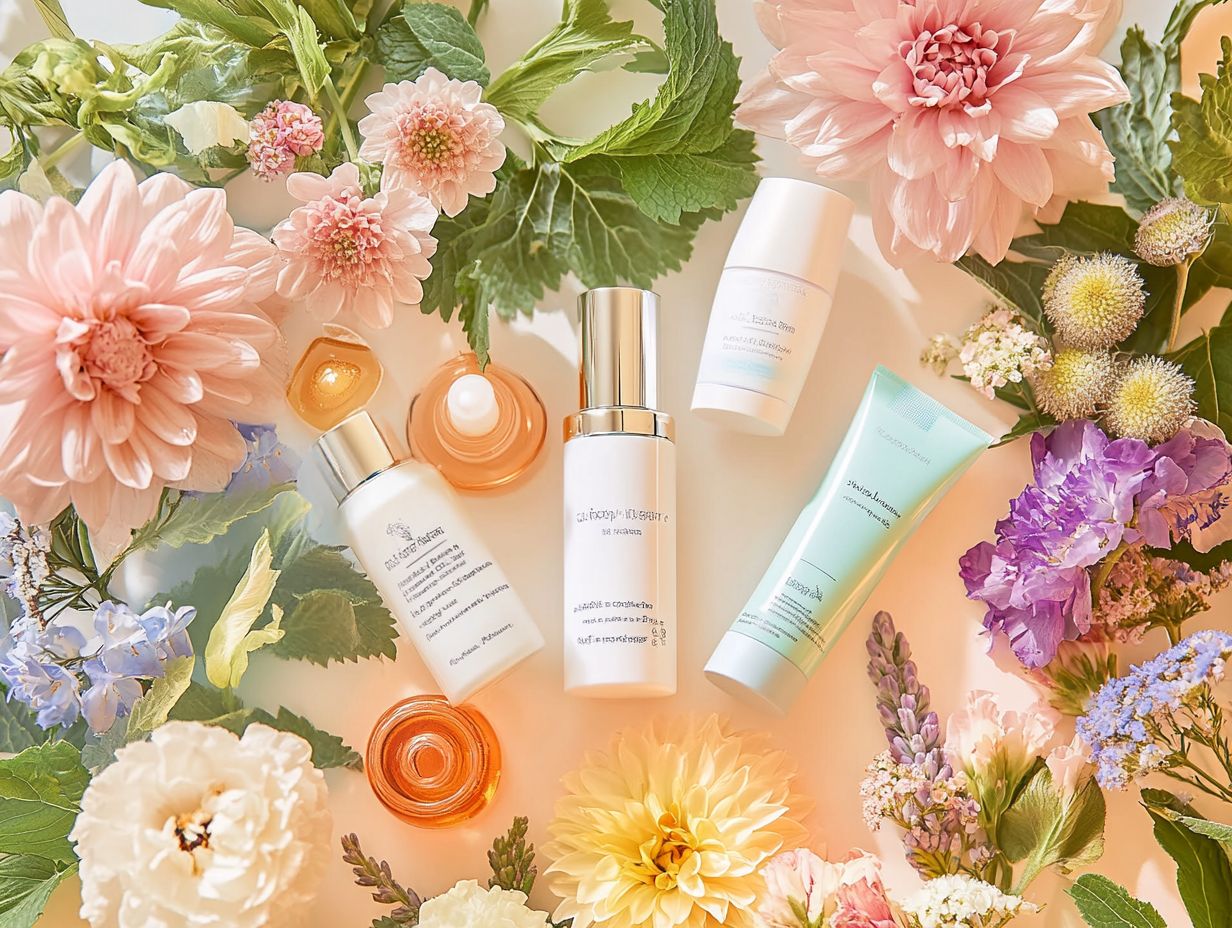
For individuals with sensitive skin, utilizing non-comedogenic makeup is essential during allergy season. This approach helps prevent clogged pores and minimizes the risk of breakouts caused by allergens.
When I select products specifically formulated to be non-comedogenic, I am choosing options that reduce the likelihood of irritation and allow the skin to breathe, particularly during times of high pollen counts.
Brands such as Clinique and BareMinerals offer foundations, concealers, and powders that are well-suited for this purpose, providing a diverse array of shades and finishes.
These products not only cater to the sensitivity associated with allergies but also create a breathable barrier that shields the skin from environmental stressors. Their gentle formulations help maintain the skin’s natural balance, making it more manageable to enjoy outdoor activities without the concern of flare-ups.
SPF Sunscreen
Applying SPF sunscreen is essential during allergy season to protect my sensitive skin from harmful UV rays while ensuring adequate hydration.
This protective measure becomes particularly important when pollen and other allergens are prevalent, as they can compromise the skin’s barrier function. I have found that individuals with sensitive skin may experience increased irritation during this time, making it crucial to select an appropriate sunscreen.
There are various types available, including mineral-based options that contain zinc oxide or titanium dioxide, which tend to be gentler on delicate skin. I make it a priority to apply sunscreen generously and reapply every two hours, especially when exposure to allergens is high.
By choosing the right products and employing effective application techniques, I can significantly enhance my skin’s defenses during allergy season.
Other Tips for Surviving Allergy Season
Surviving allergy season involves more than just using the right beauty products; it requires implementing practical strategies to significantly reduce exposure to allergens and alleviate symptoms.
I prioritize keeping allergens out of my home, while also managing symptoms with natural remedies like chamomile tea and applying a cold compress to soothe irritated skin.
Furthermore, I choose a gentle cleanser to maintain the integrity of my skin’s barrier, ensuring it stays hydrated and less reactive to allergens.
Keeping Allergens Out of Your Home
Keeping allergens out of my home requires proactive cleaning and a commitment to maintaining good air quality to minimize exposure to pollen and other irritants.
One effective strategy I employ is using high-quality air purifiers, which significantly reduce airborne particles like dust and pet dander. I also prioritize establishing a consistent cleaning routine, including vacuuming with a HEPA filter and damp dusting surfaces, to prevent allergens from accumulating.
Additionally, I make it a point to monitor outdoor conditions and limit my outdoor activities during high pollen counts, particularly in the spring and fall when levels tend to peak.
By implementing these strategies, I can create a more comfortable living environment, reducing respiratory issues and enhancing overall well-being.
Managing Symptoms with Natural Remedies
I find that managing allergy symptoms can be effectively supported by incorporating natural remedies, with chamomile being particularly noteworthy for its soothing properties and ability to reduce inflammation.
Integrating chamomile tea into my daily routine serves as a comforting solution, especially when enjoyed warm before bedtime. I also explore other herbal options like nettle and peppermint; nettle acts as a natural antihistamine, while peppermint can aid in clearing nasal passages.
Along with these herbs, I have found that consistent use of local honey may help build immunity against environmental allergens, a suggestion supported by many. Furthermore, making simple dietary adjustments, such as increasing my intake of Omega-3 fatty acids through foods like salmon or walnuts, has been crucial in reducing allergic responses and enhancing my overall well-being.


